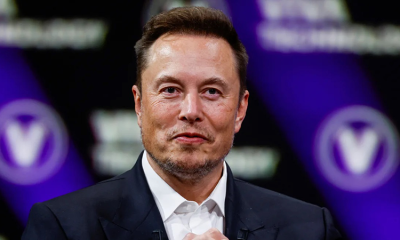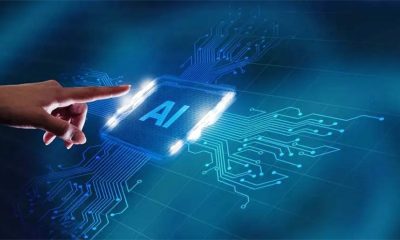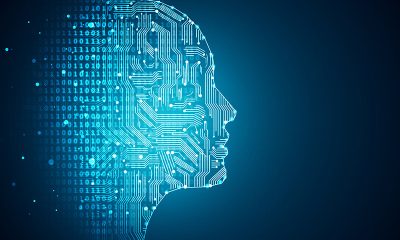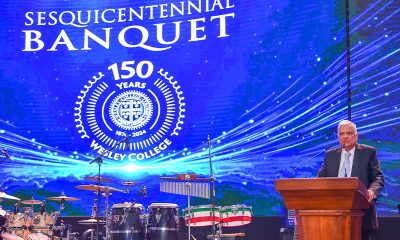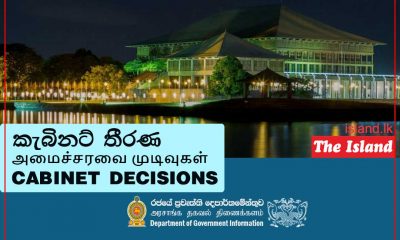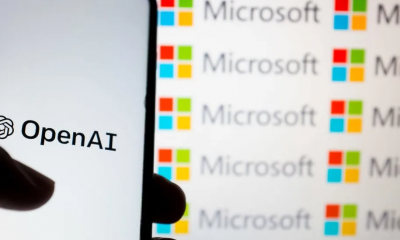Opinion
Artificial intelligence and reality of life

by Dr D. Chandraratna
Ever since President Ranil Wickremesinghe announced his desire to use Artificial intelligence (AI) to develop all sectors, from banking to agriculture, in Sri Lanka several correspondents have enthusiastically endorsed those sentiments in the print media. There is no gainsaying that technology has already made huge inroads into our lives, the latest paradigm adopted and articulated by the developed countries is thrust upon all mankind as the harbinger of a beautiful new world. Just as in an earlier time when the liberative potential of science created an understandable anguish about its misuse, similar forebodings are felt about the future curated by the super machines. Though unlike in the earlier debates where the misuse was calculated in terms of unlikely human catastrophes the current anguish is more about its ever -present transformative potential of the human world.
Most of the developed countries in the Western world, and Australia have launched statutory guidelines in the ethical use of AI. The Chat GPT, it has been cautioned in some quarters, poses such a risk to humanity that it must be subject to stringent regulation as nuclear power. Open AI founder Sam Altman has said that within a decade AI system would be capable of exceeding human expert skill levels in every domain. Given its possibility to be powerful than all other technologies experts predict that AI poses an existential risk like nuclear energy and synthetic biology. Silicon Valley experts are talking the need for a global regulatory body like the international Atomic Energy Agency (IAEA).
In the field of education, it risks accuracy and reliability of knowledge, the sources of information, academic integrity, student learning capabilities ending up with a humanity’s self-perception. Six months after Open AI launched ChatGPT, Australian University teachers have stated that they are unable to prove students who cheat with AI because still there is no regulatory body. At a conference held in Sydney last week Senior academics have railed against AI as ‘a tool in education’ because of ethical concerns, built in biases, fake knowledge and hate speech. AI is also generating enormous wealth through education in the hands of a few white male billionaires who are living off surplus value created mostly by brown and black workers.
One Deakin University academic has said it is only a data exchange service and an academic from Macquarie University said that ChatGPT app could easily be used by weak students to obtain enough marks to pass examination. Teachers may have to use open assessments and other examination methods to evaluate students. Students may be tempted to undermine their own desire to acquire knowledge in preference to the attraction of credentials to further their career prospects. Given the fact there is in the developed world a phenomenon of ‘degree inflation’ the quality and value of higher education will diminish. If cheating with the help of AI increases one’s chances of gaining the credentials thereby reducing the lure of understanding many students will not scruple to do so.
It is also the case that AI has the potential to make many employment opportunities ‘surplus to requirements’ in the knowledge economy for AI is efficient and cost cutting. Data analytic employment in multiple industry sectors will vanish overnight. Because of the fears of ChatGPT share prices of many education organisations have plummeted overnight. With the announcement of the ChatGPT, US company Chegg, which produces homework study guides, lost heavily on the stock market.
There are other dangers. The value of education as character building, knowing yourself, examining one’s life, becoming wise, which are the wider objectives of education lose their appeal. Education is reduced to a process of credentialising to make us employable. AI is driven by a few mega corporations whose commercial motives are not aligned with the wider purposes of education beyond the why and the how. Education in the AI era will be concentrating on skills for employability. It can change the current paradigm of education. AI has the potential to cultivate a narcissistic and misguided anti-intellectualism which can shut out reasoned debate on public issues.
This existential threat to our sense of personal autonomy and human agency cannot be ignored. We must legislate to protect those aspects of humanity that are exclusively human and vitally important to the functioning of democratic communities. We should be alert to the fact that AI cannot replace nuance. It is soulless, cannot feel pain or loss, has no heart and no intuition. AI like all replacements to the original will disappoint us at the crucial hour for it cannot replace years of experience, innate ability, and intuitive wisdom.
Opinion
Prof. Harshana Sasanka Rambukwella: A Charismatic Pedagogue
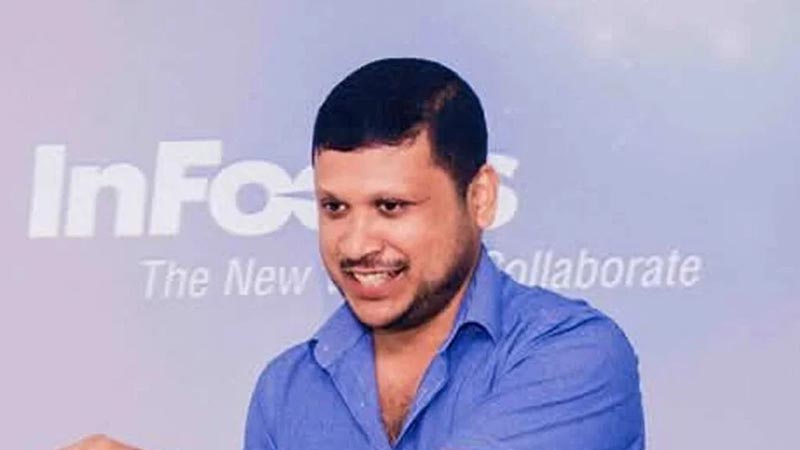
Yesterday, a sumptuous rainbow manifested over Pera. I could not but think of you, my friend!
Harshana was my batchmate at Pera in 1997.
Since he was the only boy among a bevy of girls, taking the first year English course offered by the English Department, Professor Erskine called him the “thorn among roses” at the very first lecture we had with him. But Harshana Sasanka Rambukwella was never a thorn in anyone’s side, so the name did not stick.
He was a lovely human who was happy to spread goodwill among all he associated with. What I remember most distinctly about him is that he was level-headed even as a raw fresher and could argue a point with strength without showing an ounce of unnecessary aggression. Though he had a temper it was reserved for what called for anger.
My most distinct memory of him is when he and I went to the E.F.C. Ludowyk memorial lecture, when Dr. Jayantha Dhanapala spoke on Neruda, as a poet and diplomat. We were awe -struck and though shy as freshers enjoyed the academic atmosphere and the sophistication Dr. Dhanapala exuded. I am glad we did not know of Neruda’s darker side then. That would have spoilt the experience.
I also remember that we chortled when Professor Walter Perera told us not to partake of the refreshments, sotto voce because he had not thought that many people would show up. Then later, good old “Wally,” told us to go on and tuck in because there was enough to go around, with very visible relief. The two of us laughed and chuckled all the way home.
Those were good times.
I was reminded of his temper when I met him as my Professor in my Sociology of Education class, which he taught with Professor Harini Amarasuriya. It was one of the most enjoyable sessions that I was fortunate enough to attend. He would speak on Pierre Bourdieu with such magnanimous expertise helping even the most reluctant of students understand the depth of the French sociologist and philosopher’s views on education and other matters, relating these theories as they should be adopted in the teaching of English in Sri Lanka. When students in his zoom meetings were quiet, he would say with severity, ” the level of engagement is very low.”
The Charismatic Pedagogue was the title on one of his kuppi talks contributions. He was indeed a charismatic Pedagogue.
When he brought up the notion of the Brown Sahib and Thomas Macaulay, I could not help but feel nostalgic, reminded of the time we had spent as raw freshers at Pera. There was Ramila, who remained his best friend until he passed away and of course Prashani and many others. There was nothing very raw about Harshana. He was always a gentleman whether as a young man or as the gentleman I met last on 6th August 2022, when I first visited the PGIE. He would always check my availability when he called me later on and I would say “What men! Don’t stand on ceremony just call anytime!”
It was pure irony that he was one of the judges at a competition and when my entry which went without my name won, his happiness on my success was very evident when he called to congratulate me.
As a scholar, Professor Rambukwella has made many notable contributions both as the director of PGIE and also through his quite prolific writing and research which include research papers such as , Anagarika Dharmapala: the nation and its place in the world, Patriotic Science–The Corona Virus Pandemic, Nationalism, and Indigeneity, and the countless papers he co-authored with the best in the field, and his explorations on Sri Lankan English and last but not least his magnum opus: ‘The Politics and Poetics of Authenticity: A Cultural Genealogy of Sinhala Nationalism.’ This work translated by his good friend Professor Wasantha A. Liyanage, “Amare,” will influence the Sri Lankan reader for time to come. It was a timely and necessary work which will in future help countless students, scholars and readers make sense of the dialogue surrounding the notion of Sri Lankan Nationalism as manifest in politics and literature and Sri Lankan culture. He was not simply an academic he was a man of taste who lived and loved and partook of culture.
Harshana’s life, though brief made its mark on the world because he was not simply an idealist, he was an activist and a trade unionist. He led by example and was a mentor to countless people, students, writer and scholars and a miscellany of others who defy labelling. This must be a trait that he inherited from his father, who was a mild gentleman when we met him during his stint at the English Teaching Unit, but had a reputation as one of the best teachers and school masters Dharmaraja College, Kandy could boast of.
Harshana was a great scholar, a teacher par excellence and a warm kind hearted human being. He will be missed, not only by Prashani, and the two lovely girls about whom I have heard so much, but by everyone who knew him however briefly.
Rest easy my friend! You will be loved. Your life though brief is a cause for celebration not for lament!
By Ashanthi Ekanayake
Opinion
Ragging and loss of life

Recently another life of an undergraduate was lost due to barbaric ragging at the Sabaragamuwa University. This is not the first time this happened at this University and sometime back a girl committed suicide due to inhumane ragging. It is pertinent to examine some of the factors as to why this sort of inhumane ragging goes on unabated in the universities. The most important factor as to why ragging cannot be stopped falls on the university administration. Vice Chancellors are mortally scared of these violent student groups backed by their unions to take punitive action against the perpetrators of this violence. This may be because they want to paint a picture of a peaceful atmosphere in the universities to their political masters who appointed them in the first place. These vice Chancellors are also aware of instances where strong action taken against ragging by Vice Chancellors in the past resulted in their removal such as Prof. Epitawatte at Sri Jayewardenepura and Prof, Sujeewa Amarasena at the Ruhuna University. They desist from taking action with the students because of the fear that the students will organiSe protests and even resort to physical violence against them. Academic staff members also turn a blind eye even when they see instances where ragging is openly carried out by the seniors. This may be because they themselves were raggers in the past and see nothing harmful in such sordid instances of ragging. Unlike in the past, ragging today is inhuman, violating privacy and forcing hapless undergraduates into the worst forms of human torture.
Ragging is most prevalent in halls of residence where the wardens and sub wardens simply turn the other way and never try to stop this menace. Wardens are collecting points for their next promotion and do not see that it is their duty to look after the welfare of the students.
Police, too, are to be blamed for not taking action against raggers under the Anti-ragging Act even after the university produces these culprits at the police station. I can well remember the case of a ragging incident at the Peradeniya University, where the accused were handed over to the police and they wanted to record it as a case of two student groups involved in a fight. Some time ago, the Police Department stated that all forms of ragging should be reported to the CID but nothing happened under this arrangement. Similarly, recently the Attorney General gave an undertaking to the supreme court that the vice chancellors have been instructed to prevent ragging in the universities but this is just restricted to actions on paper and nothing substantial has come out. Similarly, the Attorney General’s department takes years to prosecute raggers who have been caught, produced before judges and released on bail. There is a case of some agriculture faculty students who were caught red handed in a safe house outside the University premises at Peradeniya several years ago. The Attorney General has still not filed action against these students.
This year 1250 students have been selected to the Faculty of Arts at the Peradeniya University, where there are only150 males including 30-Buddhist monks. This shows that males shy away from attending a state university and think that it is better for them to go to a private university where there is no ragging. In fact, private universities have more males than females and the underlying reason is the lack of ragging in these private universities.
The political parties who back the student unions cry hoarse for preserving free education but they do not have the slightest idea that these ragging incidents are a big threat to free education. It is up to the Government to set up effective mechanisms to curb ragging including strict instructions to the police and the legal system to deal with these cases under the anti-ragging act.
by Professor O. A. Ileperuma,
Emeritus Professor, University of Peradeniya
Opinion
Remembering Dr. Samuel Mathew: A Heart that Healed Countless Lives
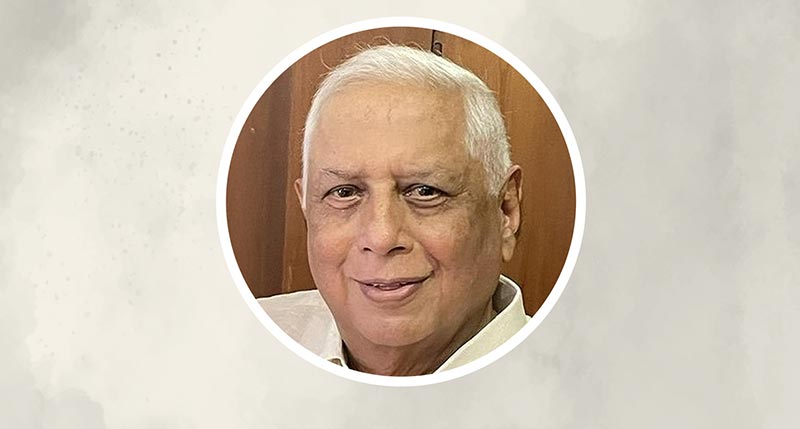
It is with a deeply heavy heart that I express my sincere condolences on the passing of Dr. Samuel Mathew Kalarickal on the 20th of April 2024. Born in 1948, Dr. Samuel was not only a pioneer of interventional cardiology in India but a giant in South Asian healthcare whose influence extended far beyond national borders.
A Beacon of Excellence and Compassion
Known as the “Father of Angioplasty” in India, Dr. Samuel introduced life-saving coronary interventions when they were still rare. His leadership at Apollo Hospitals and Kokilaben Dhirubhai Ambani Hospital brought cardiac care to global standards. But beyond the accolades, it was his humility, compassion, and unwavering dedication to patients that truly set him apart.
A Lasting Impact on Sri Lanka
Dr. Samuel played a pivotal role in shaping modern cardiac care in Sri Lanka. In the 1990s and early 2000s, many Sri Lankan patients sought his expertise in India, trusting him with their lives. He treated them with care and dignity, leaving lasting impressions on families across the island.
He also trained and mentored numerous Sri Lankan cardiologists, generously sharing knowledge of advanced procedures and technologies. His efforts helped uplift cardiac care back home and empowered many of us to bring those skills to our own communities.
A Mentor Who Lit the Path
To me, Dr. Samuel was more than a mentor—he was a fatherly figure. I fondly recall our time at the 2011 Coimbatore meeting, where he urged me to form the Sri Lanka STEMI Forum. His guidance helped us create national strategies and treatment models for heart attack care—an initiative that continues to save lives today.
A Legacy That Lives On
Dr. Samuel leaves behind more than medical breakthroughs. He leaves behind a legacy of service, inspiration, and heart. His memory will live on in every life he touched, every doctor he guided, and every patient he healed.
You will be remembered always, Sir—not just for what you did, but for who you were.
May your soul find eternal peace.
– Dr Gotabhaya Ranasinghe
-

 News6 days ago
News6 days agoJapan-funded anti-corruption project launched again
-

 News6 days ago
News6 days agoSethmi Premadasa youngest Sri Lankan to perform at world-renowned Musikverein in Vienna
-

 Sports5 days ago
Sports5 days agoOTRFU Beach Tag Rugby Carnival on 24th May at Port City Colombo
-

 News3 days ago
News3 days agoRanil’s Chief Security Officer transferred to KKS
-

 Business6 days ago
Business6 days agoNational Savings Bank appoints Ajith Akmeemana,Chief Financial Officer
-

 Opinion1 day ago
Opinion1 day agoRemembering Dr. Samuel Mathew: A Heart that Healed Countless Lives
-

 Features4 days ago
Features4 days agoThe Broken Promise of the Lankan Cinema: Asoka & Swarna’s Thrilling-Melodrama – Part IV
-

 Features5 days ago
Features5 days agoTrump tariffs and their effect on world trade and economy with particular



